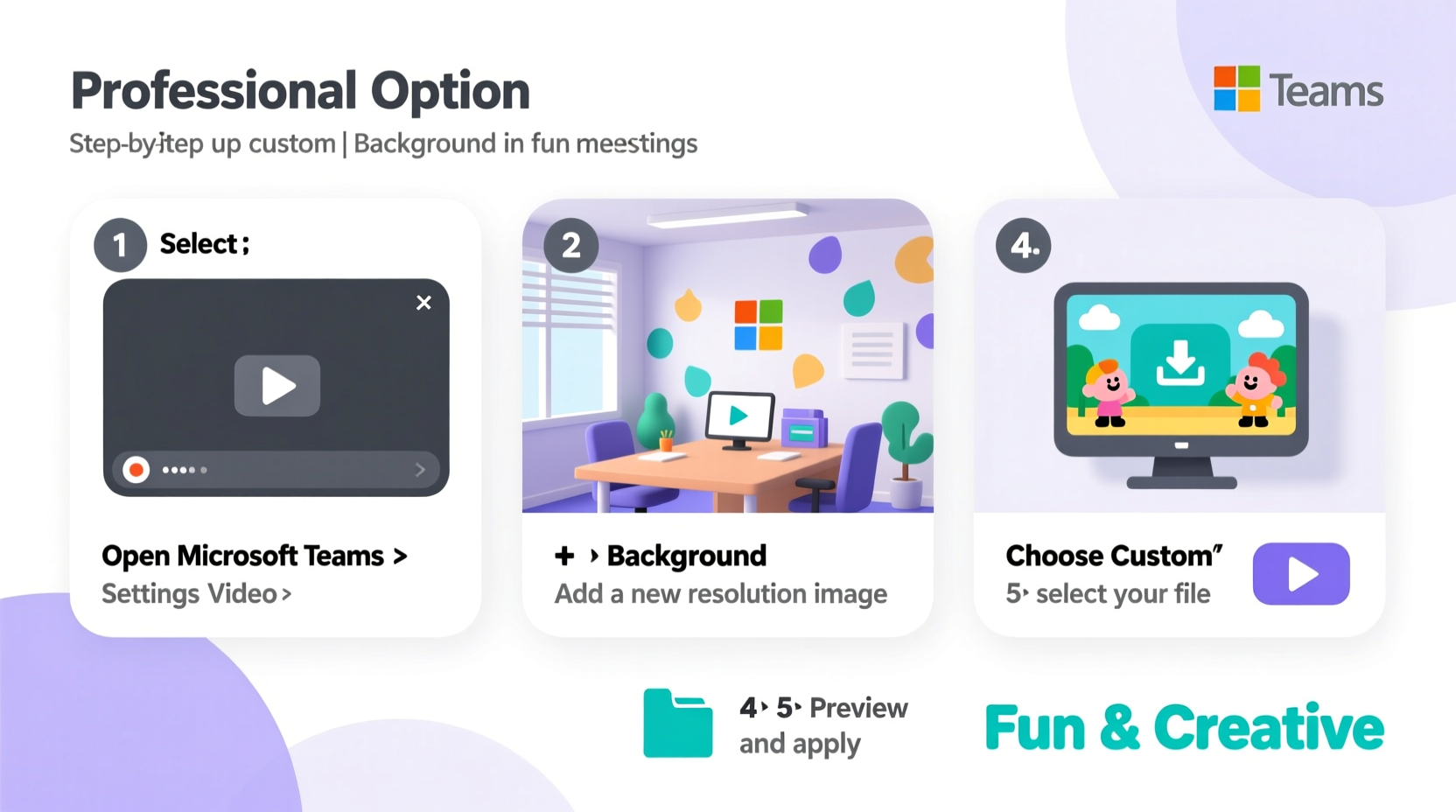In today’s hybrid work environment, video meetings are a daily reality. While face-to-face interaction is valuable, not every home office or living room is presentation-ready. That’s where Microsoft Teams’ background feature comes into play. Whether you want to maintain professionalism during client calls or inject some personality into team check-ins, custom backgrounds offer both utility and creativity. This guide walks through everything you need to know—from technical setup to choosing the right image—for an effective and engaging virtual presence.
Why Custom Backgrounds Matter in Microsoft Teams

Virtual backgrounds in Microsoft Teams do more than hide cluttered rooms or noisy environments—they shape perception. A well-chosen background signals preparedness, reinforces brand identity, and minimizes distractions. On the flip side, playful or themed backgrounds can boost morale during casual team gatherings or holiday events.
The technology behind these effects uses AI-powered segmentation to separate your figure from the background. For best results, good lighting and a clear contrast between you and your surroundings improve accuracy. Poorly lit spaces or complex patterns may cause glitches like flickering edges or partial invisibility.
“Virtual backgrounds aren’t just cosmetic—they’re part of digital professionalism. They help maintain boundaries between personal and work life.” — Dr. Lena Patel, Remote Work Consultant at FutureWorkspace Labs
How to Set Up a Custom Background: Step-by-Step
Microsoft Teams makes it easy to upload and apply custom images. Follow this sequence during any active meeting or beforehand in your settings.
- Open Microsoft Teams and sign in with your account.
- Join or start a meeting. The background option becomes available once you're in a call.
- Click on the three dots (…) in the bottom-right corner of your camera preview to open More actions.
- Select “Show background effects” from the dropdown menu.
- In the panel that appears, choose from preloaded options or click “Add new” to upload your own image.
- Navigate to the image file on your device (supported formats: JPG, PNG, BMP—under 5MB).
- Once uploaded, select the image to apply it instantly.
Setting Backgrounds Before a Meeting (Desktop App)
You don’t have to wait until a meeting starts. Pre-select your preferred backdrop:
- Go to your profile picture in the top-right corner and select Settings.
- Navigate to Devices > Background effects.
- Upload or choose a default/background here. It will be ready when you join your next call.
Choosing the Right Image: Professional vs. Fun Use Cases
Not all backgrounds serve the same purpose. Your choice should align with context, audience, and intent.
| Purpose | Recommended Style | Image Examples | Avoid |
|---|---|---|---|
| Client Presentations | Neutral, branded, minimal | Office skyline, company logo overlay, soft gradient | Bold colors, animations, busy scenes |
| Internal Team Meetings | Lightly branded or thematic | Team mascot, project name backdrop, seasonal theme | Overly casual memes or dark visuals |
| Celebrations & Social Events | Festive or humorous | Beach scene, party confetti, holiday fireplace | Work-related imagery |
| Daily Stand-ups | Consistent and clean | Simple blurred texture, home office simulation | Frequent changes causing distraction |
Technical Requirements for Optimal Results
- File size: Under 5MB to ensure quick loading.
- Dimensions: 1920x1080 pixels (full HD) recommended for clarity.
- Format: JPG or PNG for compatibility; PNG supports transparency if needed.
- Lighting: Front-facing light reduces shadows and improves edge detection.
Mini Case Study: Boosting Engagement at TechFlow Inc.
TechFlow Inc., a mid-sized software firm, noticed declining engagement during weekly all-hands meetings. Employees often joined from bedrooms or shared spaces, leading to awkward interruptions and visual clutter. To create consistency, the HR team introduced a policy allowing—but not requiring—custom backgrounds.
They designed a set of five official backgrounds featuring the company’s product interface, team photos, and motivational quotes. These were distributed via internal SharePoint. For fun Fridays, employees could use approved lighthearted themes like “Space Office” or “Underwater Desk.”
Within two months, post-meeting surveys showed a 34% increase in perceived meeting quality. One engineer noted, “It feels like we’re all in the same place now—even though we’re scattered across six states.”
Best Practices Checklist
To get the most out of Microsoft Teams backgrounds, follow this actionable checklist:
- ✅ Test background performance in a test meeting before going live.
- ✅ Use high-resolution images (1920x1080) to avoid blurriness.
- ✅ Maintain consistent lighting—avoid backlighting or dim rooms.
- ✅ Limit animated or flashy backgrounds to non-client settings.
- ✅ Respect branding guidelines when using logos or corporate colors.
- ✅ Keep file sizes under 5MB for faster rendering.
- ✅ Rotate sparingly—too many changes can distract participants.
Frequently Asked Questions
Can I use animated or video backgrounds in Microsoft Teams?
No, Microsoft Teams currently only supports static images (JPG, PNG, BMP). Animated GIFs or videos are not supported as virtual backgrounds. However, third-party plugins or external virtual camera tools may offer this functionality, though they come with potential security and compliance risks.
Why does my background look blurry or distorted?
This usually happens due to incorrect resolution or aspect ratio. Teams stretches uploaded images to fit the screen. If your image isn't 16:9 (e.g., a vertical phone photo), it will be cropped or warped. Always use a 1920x1080 image for optimal display.
Do virtual backgrounds work on mobile devices?
Limited support exists. On iOS and Android, Teams allows background blur but not custom image uploads. You can blur your background for privacy, but full customization is only available on desktop apps (Windows and macOS).
Final Thoughts and Action Steps
Custom backgrounds in Microsoft Teams are more than a novelty—they’re a tool for communication control, branding, and emotional tone-setting. Whether you're presenting to stakeholders or unwinding with colleagues after a long sprint, your backdrop influences how you’re seen and how others feel.
Start small: pick one professional background for recurring meetings and one fun option for informal catch-ups. Share templates with your team to build cohesion. Over time, refine based on feedback and technical performance.









 浙公网安备
33010002000092号
浙公网安备
33010002000092号 浙B2-20120091-4
浙B2-20120091-4
Comments
No comments yet. Why don't you start the discussion?